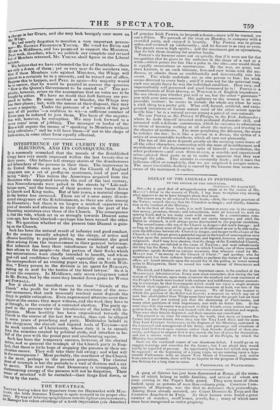INTERFERENCE OF THE CLERGY IN THE ELECTIONS, AND ITS CONSEQUENCES.
It is commonly remarked that the morals of the Established Clergy have very much improved within the last twenty-five or thirty years. Our fathers tell strange stories of the drunkenness and debauchery of the parsons in their time. The impression in the United States even now is, that the Church of England clergymen are a set of profligate sportsmen, fond of port and haling " duty." This notion the Americans acquired from the Dissenters who emigrated towards the end of the last century, when Nonconformists were pelted in the streets by " Life-and- fortune men," and the houses of their pastors were burnt down by Church and King mobs. But of late years, a material change for the better has occurred. There are of course many ill-con- ducted clergymen of the Establishment, as there are also among the Dissenters; but there is no longer a marked superiority in point of morals and attention to their duties on the part of the Dissenting ministers over those of the Church. The consequence is, that the tide, which set in so strongly towards Dissent some years ago, has been".checked—perhaps has been turned the other way. We question whether at the present time Dissent is gain- ing on the Church.
Such has been the natural result of industry and good conduct. But the course recently adopted by the clergy, of active and offensive hostility to popular polities, must counteract the good effects arising from the improvement in their general behaviour. Most indecent has been their interference in behalf of candi- dates odious to the people—to that portion of their flocks which their ministrations were chiefly intended to benefit, and whose good.iiill and confidence they should especially aim to acquire. The correspondent of an evening paper says, that in North Wilt- shire, "Every person in the division is an agent for BURDETT, making up in zeal for the tactics of the hired lawyer." So it is all over the country. In Middlesex, only seven clergymen voted for Mr. BYNG, but by the score they hunted down game for WOOD and POWNALL.
Now it should be manifest even to those " friends of the Church" who profit for the time by the exertions of the reve- rend canvassers, that such unseemly conduct must degrade the clergy in public estimation. Even experienced attornies avow their disgust at the scenes they must witness, and the work they have to go through, in the course of a contested election. The party op. posed to the parsons view the interference of the latter with in- dignation. More hostility has been engendered towards the Church in the course of the last few weeks, than can be allayed by seven years of preaching and piety. Multitudes behold in their clergymen the slavish and bigoted tools of Toryism—not the meek apostles of Christianity, whose duty it is to smooth down the enmities created by political strife, and interfere in be- half of the poor with the proud peer and overbeariter squire.
Such has been the temporary success, however, of the clerical tactics, and so general the triumph of the Church party in Eng- land, that there is little hope of stopping the parsons in their un- christian career. They will take their full awing; and what will be the consequence ? Most probably, the overthrow of the Church M the next, perhaps in the present generation. The clerical shout of triumph is but the prelude to a wail of distress and a cry for mercy. The next time that Democracy is triumphant, the electioneering energy of the parsons will not be forgotten. Their
means of mischief will be curtailed—their fangs filed down, or fora II- by the roots.


























 Previous page
Previous page